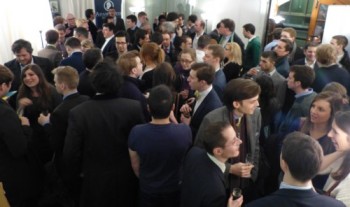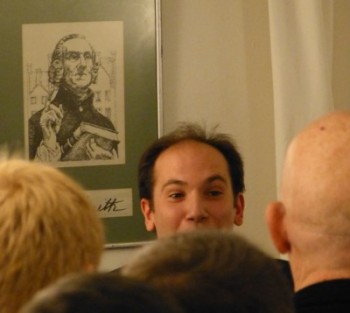We are developing the social individualist meta-context for the future. From the very serious to the extremely frivolous... lets see what is on the mind of the Samizdata people.
Samizdata, derived from Samizdat /n. - a system of clandestine publication of banned literature in the USSR [Russ.,= self-publishing house]
|
There is a very funny article by Reason, titled The stupidest pseudo-story of the week, about a Daily Mail article about halal food. Reason likens the hysteria to criticising kosher food with a headline:
RABBIS ARE PUTTING SOME WEIRD JEW-SPELL ON YOUR MEALS!
I LOL’ed. But then again, it is often said I am famously easy to amuse 😛
And black people, as always, are left to clean up the shit that drops from the imperial anus of white corporate America into the ghettoized toilets of terror
– Nyle Fort
Whaddya think? Are either of these two articles from the Guardian Comment Network (i.e. lefty blogs to which the Guardian gives a larger audience) for real, or are they magnificent satire?
From SE Smith, a writer who “lives and works in northern California, covering social justice issues”: ‘The people are so beautiful!’ That’s enough of the colonial tourism
While you’re drooling over Indian women in saris at the produce market, are you paying attention to the women organising against mining companies and western intrusions in India? Are you paying attention to the women opposing tourism and fighting objectifying activities in their communities?
From Tom Whyman, a well-named PhD Philosophy student: Beware of cupcake fascism
…this has an effect on our culture that we can understand as being a sort of gentrification. The cupcake has always itself been a gentrifying force: after all, the “pop-up cupcake shop” is the paradigmatic pop-up shop. But what all these things do is assert the infantilised values of an increasingly infantilised middle-class world on general society. This is how the passive-aggressive violence of the infantilised twee fascist manifests itself: moving across the world with a cupcake as a cowcatcher, shunting out everything that does not correspond to the values manifested within it; a much more effective way of sweeping up the sort of (poor, working-class, black) forces that informed the 2011 London riots than any broom.
“But what is it about my argument that they find so objectionable?” I’ve often asked myself. “What exactly is so evil about arguing, say, that schools should teach kids rigorously, or that climate scientists should do more science and less political activism, or that bigger government only perpetuates the power of a corrupt elite at the expense of ordinary people?”
And the conclusion I’ve long since reached is that there are some people out there who you’re simply never going to reach through logic or sweet reasonableness or basic courtesy. These people will always hate me – and those who think like me – as a matter of fundamental principle. It’s an ideological clash of total opposites: tyranny v liberty; poverty v prosperity; hysteria v reason; the state v the individual; misery v happiness.
So in what way, may I ask, would it be a sensible policy to halve the difference between those two extremes in order to reach some kind of “reasonable” consensus?
It’s what I call the ‘Dogshit Yoghurt Fallacy’.
On one side of the argument are those of us who think yoghurt works best with a little fruit or maybe just on its own. On the other are those who believe passionately that what yoghurt really needs is the addition of something more earthy, organic, recycled – like maybe a nice scoop of dogshit.
Now you can call me a dangerous extremist if you like, for refusing under any conditions to accommodate the alternative point of view. Or you could call me one of those few remaining brave souls in a cowardly, compromised world still prepared to tell it like it is: that dogshit into yoghurt simply doesn’t go, no matter how many expert surveys you cite, nor how eco-friendly it shows you to be, nor how homeopathic the dosage.
– James Delingpole, in a piece entitled Andrew Breitbart’s War Comes To Britain, explains why he has become the new Executive Editor of Breitbart London.
Also recommended, by Delingpole for Breitbart: 10 Lefty Lies About The Floods Which Have Devastated Britain.
George Lakoff says, ‘Liberals do everything wrong’
“Progressives want to follow the polls … Conservatives don’t follow the polls; they want to change them. Political ground is gained not when you successfully inhabit the middle ground, but when you successfully impose your framing as the ‘common-sense’ position.”
If all political belief originates from one of two wellsprings, if the last thing you should do to propagate your belief is to water it down, if backing it up with facts just weakens it, what would a debate look like, in a world of perfectly understood frames?
…
It is, plainly, the longstanding failure to protect nature that powers Lakoff’s exasperation with liberals. “They don’t understand their own moral system or the other guy’s, they don’t know what’s at stake, they don’t know about framing, they don’t know about metaphors, they don’t understand the extent to which emotion is rational, they don’t understand how vital emotion is, they try to hide their emotion.
Unlike Professor Lakoff, I think that liberals (in the US sense of the word) propagate their ideas quite successfully, but his advice on framing seems well worth following.
A feature of British reporting on American affairs is that even newspapers that sell themselves as right wing or too grand to take a side in US politics take their tone straight from the Democratic party. For instance, this Times report of the State of the Union address appears in the news section, not the opinion pages, yet in this paragraph
Offering a shopping list of practical plans to speed up growth and give people new ladders of opportunity into the middle class, he told members of Congress: “I’m eager to work with all of you”.
the writer, David Taylor, takes it for granted that President Obama’s plans are “practical” and indubitably will “give people new ladders of opportunity”. Was there not room for a little “intended to” anywhere in that line, Mr Taylor?
Again, this report from Peter Foster in the supposedly right wing Telegraph takes one look at Obama performing the standard politician’s trick of admitting to the fault of excessive reasonableness, and falls in love:
However, that optimism was tempered with a frank admission that America’s politics had become paralysed by the “rancorous argument over the proper size of the federal government”. The president wearily admitted that reversing the tides of decline “won’t happen right away, and we won’t agree on everything.”
We all understand where the problem lies: with the rancorous ones who argue about the proper size of government. If only they would stop doing that our weary hero could rest.
I am ready to be told in the comments that the Dems and the Repubs really are not that different. Allow me to agree in advance. It is just that the way that the Times and Telegraph maintain faithful station like Greyfriars Bobby long after their better paid friends in the Boston Globe and New York Times have noticed that the object of their devotion is politically dead is making a vein throb. Which reminds me, we were not always thus. As the great Malcom Tucker put put it during his visit to Washington (2 minutes 10 seconds into the clip):
“We burnt this tight-arsed city to the ground in 1814 and I’m all for doing it again.”
(Warning: occasional words in the compilation of scenes from In the Loop linked to above are not viciously obscene.)
I note with pride that two hundred years ago arguments about the proper size of the federal government were settled in a decisive yet still gentlemanly fashion. Wikipedia’s account of the burning of Washington says that “The British commander’s orders to burn only public buildings and strict discipline among the British troops are credited with preserving the city’s private buildings.” We even spared one of the more useful government buildings:
It is written that a loaded cannon was aimed at the Patent Office to destroy it. Thornton “put himself before the gun, and in a frenzy of excitement exclaimed: ‘Are you Englishmen or only Goths and Vandals? This is the Patent Office, a depository of the ingenuity of the American nation, in which the whole civilized world is interested. Would you destroy it? If so, fire away, and let the charge pass through my body.’ The effect is said to have been magical upon the soldiers, and to have saved the Patent Office from destruction.
Despite this lapse, Major General Robert Ross did burn to the ground the White House, both houses of Congress, the War Office, the State Department and the Treasury, although I gather someone has rebuilt them since.
I am currently trying (although I promise nothing) to write a review of The PR Masterclass by my friend and occasional Samizdatista Alex Singleton. I had hoped to be able to combine this review with a report of the launch of the book that took place in the offices of the Adam Smith Institute on Tuesday evening of this week, but the former project is now delaying the latter, so here are some pictures of the launch. My more considered thoughts on the book will have to wait, not for too long, I hope.
As so often, what really mattered at this event was not who spoke at it or what they said, but how many people were there to listen and to stand around trying to impress each other with their various opinions and alleged triumphs. The answer last Tuesday was: a lot. The place was packed out:

If you write a book called The PR Masterclass and you arrange a book launch for it, you had better assemble a decent throng of people. If word gets out via the few who did attend how few attended, you will come over as very foolish. That mission was definitely accomplished, that landmine definitely not stepped on. Alex told me later that the people present were a mixture of ASI-type “movement” people, PR professionals, and journalists. Just what he wanted, in other words.
One reason why so many people showed up was that Alex had obtained an impressive star speaker:

Guido started by remembering the old Globalisation Institute that Alex Singleton used to run, and how amazingly lavish was the press coverage that the Globalisation Institute used to get. Then he reminisced about a drunken night out the two of them had had, which had landed Guido in court. Or something. At this point in his speech Guido started speaking too quietly for me, at the back, to hear properly. But the people nearer the front of the throng seemed amused, and anyway, it doesn’t matter what gets said at these things. The point is for it to be made clear that a Big Cheese like Guido wants you to buy the book, is a friend of the author, blah blah. If you want to be in with the in-crowd, read this book.
Alex himself also spoke, briefly:

I like that one, but I like this one even more:

Both snaps capture, I think, the fact that Alex Singleton is an enthusiast about what he does, but that he doesn’t take himself too seriously. Some people might grumble about a picture like that second one of them. Alex won’t.
Alex had emailed me earlier to say that it would be fine if I brought my camera with me, and used it. As is my habit, I looked to see if others were taking photos, but only spotted one, standing right next to me:

Had Alex not emailed me beforehand that me photoing would be fine, I might have refrained. That he found time to include this in the email he sent me about this event is typical of his attention to detail, and of his ability to see the world through the eyes of the people he is trying to influence, surely the core PR attitude. (And hey, I just got a phone call from him saying do I have any photos that he can use?)
As for the book, in the event that I never get around to posting my properly serious review of it any time soon, let me now supply a short summary of what I already know I will be saying: the book is very good.
One other thing, which also points up that this felt like a very successful event, and that Alex was coming across as a very successful and significant chap. While trying to impress those around me, I found myself talking about my Brian’s Last Fridays, and how brilliant they have so far been since I resumed doing them in January of last year. Someone asked me who will be my next speaker, on the last Friday of January, i.e. on the evening of January 31st. My reply? “Oh, yes. Come to think of it: Alex Singleton.” This actually did impress people, or so it seemed to me.
I’m being rather frivolous about all this, but it really is quite a significant little fact about the world that one of the leading personalities in the bit of it that concerns itself with PR is now Alex Singleton, i.e. someone who probably agrees with me, and very possibly also with you, about really quite a lot of things. On the jacket of the book, Singleton’s publishers start their blurb about him by describing him as “one of the world’s leading public relations strategists”. That one could show up at this event and feel that this was not an obviously over-the-top or ridiculous or embarrassing claim is, I think, quite something.
What Patrick Crozier called the First World War War continues. Although the trenches have long been dug, the conflict can revert to being a war of manoeuvre with surprising speed, and sometimes evidence leaks out of mutiny among the troops of even the most committed belligerents.
From the BBC of all people: Lions and donkeys: 10 big myths about World War One debunked
Here are the ten myths debunked by the article:
1. It was the bloodiest war in history to that point
2. Most soldiers died
3. Men lived in the trenches for years on end
4. The upper class got off lightly
5. ‘Lions led by donkeys’
6. Gallipoli was fought by Australians and New Zealanders
7. Tactics on the Western Front remained unchanged despite repeated failure
8. No-one won
9. The Versailles Treaty was extremely harsh
10. Everyone hated it
I am surprised and heartened to see this article from this source, particularly because it is by Dan Snow, a popular programme maker. I am also glad to see these points made because they are true.
ADDED LATER: The outcome of the First World War War matters to the cause of liberty now. Discuss.

I have also just watched the latest Sherlock. If you live in the UK, the chances that you watched it as it was first broadcast are approximately one in seven. Despite the fact that this is a simultaneous British television watching event of the first order, the percentage of people who watched it is less than half what it was for peak television events of the 1960s to 1980s. That said, I want a set of those beer glasses. Oh Lord, I want a set of those beer glasses.
If you don’t live in the UK, torrents are appearing right now and you will be able to watch it shortly. If you live in China, you are able to watch it on the legal Youku Tudou streaming service right now. If you want to watch it legally in most other places, you will have to wait a few days to a few weeks. I suspect, though, that most of the people who really want to talk about it will have watched it by this time tomorrow. Versions with strange, semi-accurate hacked on subtitles will be out there any moment now. Then they will talk, and talk, and talk, in various languages and through various translation tools.
Things weren’t always thus. I am a middle aged expatriate Antipodean fogey. Watching film and television while growing up in Australia in the 1970s and 1980s in Australia was a strange thing. Inevitably, most of the movies we watched came from America, and most of the television we watched in Australia came from America. In America, television seasons start in October, run through the winter months, and then end in about April. The biggest blockbuster movies are released between May and July. In Australia, though, the summer movie season started on December 26, and the television season went from February to September. This means that movies that had been hits in the American summer would often be held over for more than six months, and television seasons that had started in October in the US would not commence showing in Australia until February of the following year.
Even by 1982 this had become tiresome with movies. I remember reading about a movie called “E.T.” that was supposed to be wonderful, and waiting endlessly. (I found it vaguely disappointing. Some of this might have been the wait). Even the existence of VHS was enough to break this down. By the 1990s, Hollywood had found that it was best to open movies as close as possible to simultaneously around the world as possible, both for reasons of piracy prevention, and because of the simple fact that publicity campaigns and other buzz could not be stopped from crossing borders.
Television was a little more odd, though. For one thing, there was less realisation that there was a problem. Television had certain peculiarities – for instance Christmas episodes of foreign series always aired in May – but this was no more peculiar than eating an enormous Christmas dinner of ham and turkey in 40 degree heat, or watching live major sporting events on TV in the middle of the night, as Australian sports fans are known to do on a weekly basis. In any event, local print media – mostly owned by the same companies that owned the television stations – would play ball, and there would be no discussion of new episodes of television series until the television series aired locally.
But of course, modernity (by which I mean the internet) eventually happened. It became trivially easy to watch any programme almost as soon as it was aired. Those people who wanted to talk about television with other people on the internet (in Australia and elsewhere) found it imperative to watch at the same time, and they did. And they do. (Okay, I admit it. And we did. And we do). Piracy of music and of first run movies seems to have declined, because the legal options for listening and watching at the same time everywhere are now pretty good. Piracy of programming from regular series television seems to have gone way up, though. Television networks around the world are getting closer to airing things on the same day, but they are still probably not good enough for people who want to watch the next day, without spoilers. (In Australia, the same old television networks are still rather tilting at windmills to stop piracy, even with the help of a US Ambassador who believes an important part of his job is to discourage Game of Thrones piracy). National television moments have declined, however it feels when watching Sherlock in the UK. Global television moments have grown spectacularly. The industry is yet to catch up by giving global audiences legal ways to achieve these moments.
Except that in China, piracy is feared to such an extent that the purveyors of legal streaming have actually chosen to give viewers what they want when they want. The rest of the world may follow soon. I hope so.
Also, with Sherlock being such a big hit in the manufacturing capital of the world, I will hopefully be able to order the beer glasses on ebay any moment now.
I have just watched the latest Sherlock. The chances are good that if you live in the UK, so have you.
You know how first videos, then DVDs, then the multiplication of channels and on-demand telly internet replay thingummies killed off the simultaneous collective experience of television?
It’s back. Not, I hasten to add, that I would know anything about Twitface from personal experience, but there are plenty of people nowadays who simply must watch Sherlock or Dr Who live so that they can talk about it on the internet the minute it is over.
That’s the counterintuitive thing about totalitarian systems. They herd people into Borg-like collectives, yet every individual is savagely atomized.
I never felt so alone in my life.
– Michael Totten writes about the “total surveillance police state” that is Cuba.
It isn’t “counter-intuitive” to me, and probably not to Totten either, but I guess it still is to many. I worked out long ago that totally nationalising society totally destroys society, and that the greatest freedom of a free society is the freedom to choose what company you keep, both when you work and in your time off working.
The headline above Allister Heath’s latest over at City A.M. reads as follows:
America is slashing spending – but its economy is still growing
By “spending” Heath, or Heath’s headline writer in the event that it’s not Heath, means government spending.
We’ll know we’re really winning when headlines like that one replace the “but” with an “and”.
|
Who Are We? The Samizdata people are a bunch of sinister and heavily armed globalist illuminati who seek to infect the entire world with the values of personal liberty and several property. Amongst our many crimes is a sense of humour and the intermittent use of British spelling.
We are also a varied group made up of social individualists, classical liberals, whigs, libertarians, extropians, futurists, ‘Porcupines’, Karl Popper fetishists, recovering neo-conservatives, crazed Ayn Rand worshipers, over-caffeinated Virginia Postrel devotees, witty Frédéric Bastiat wannabes, cypherpunks, minarchists, kritarchists and wild-eyed anarcho-capitalists from Britain, North America, Australia and Europe.
|









